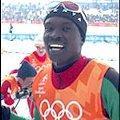Next month, Vancouver and Whistler, Canada will host athletes from more than 80 nations at the 2010 Winter Olympics. Some of the countries sending athletes might surprise you. Not only will the Jamaican bobsledders be back, but so will skiers from countries like Kenya that rarely, if ever, see snow. They'll also coming from countries like Peru, which have no winter sports tradition. But Jamaican, Kenyan and Peruvian winter Olympic hopefuls have found the perfect snowy training ground in the American West.
Nike moves from sneakers to skis Kenya's first and only Winter Olympian, Philip Boit, at the Methow Valley SuperTour race Nike can take some credit for launching the career of Kenya's first and, so far, only winter Olympian. The Oregon-based sportswear giant has long sponsored world class distance runners from Kenya.
In the mid-1990's, runner Philip Boit responded to an offer to try something a little different. "They wanted to see if these Kenyans who are doing very well in running long distance, how about if we change them a little bit to try this skiing, [since] they have that good endurance." So, at the age of 24, the Kenyan got a ticket to Finland to learn how to cross country ski. "They talked about skiing, I didn't know skiing. I have no idea about winter. I didn't know about snow." But two years later, Boit was at the Winter Olympics in Nagano, Japan. He finished dead last. Nike dropped its African ski team experiment the next year. But Boit wasn't ready to settle down on the family farm, and still isn't. A training ground half-way around the world Philip Boit chats with a fan after the race Earlier this month, Boit arrived in Washington State to try to qualify for his fourth and, he says, final Olympics. "I'm financing myself," he said. "My family, they are also helping. There are so many people trying to help." That includes American fans who have come forward to donate coaching time, a gym membership, new skis and transportation.
Methow Valley resident Danica Kaufman is one of many in north central Washington to open her home to Boit, offering a place to stay while he trains.
"Well, the Methow doesn't have a lot of diversity," she said with a laugh. "Philip is just such a warm personality and such a neat story. He told me just this morning that he had to sell a couple of cows from his farm in order to fund his last part of his trip here. It's just unlike the world we live in." Kaufman notes Olympic qualifying standards have gotten tougher. She believes that's partly the result of the slow finishes of long-shot Olympians like Boit. A different kind of skiing Seattle resident Roberto Carcelen, (number 3), crosses the finish line at the 2009 World Championships in the Czech Republic Roberto Carcelen grew up in Peru, but now lives and trains in Seattle, Wash. Love brought him to the Pacific Northwest about eight years ago. He married a woman he met on the Internet, who works at Microsoft.
Carcelen recalls how his wife introduced him to cross country skiing in the Washington Cascades. "And I was like, 'Where are the downhill runs? Where's the chairlift?' She explained to me that this is a different kind of skiing." Although Peru has tall mountains, Carcelen said there are no ski resorts in his homeland. The sport of cross country skiing is unknown. But he liked it so much after trying it that, "the next day I went to REI and bought the whole equipment." In 2006, Carcelen watched on television as athletes from Kenya, Portugal and Brazil skied in the Olympics in Torino, Italy. He thought, 'I could do that,' and eventually started training to become Peru's first winter Olympian. "I am bringing up winter Olympics to a country that has no tradition on the snow sports," he said. "Also, it's a way to prove that any other master-level athlete can achieve higher standards, even having a full-time job. You can find the time." Carcelen has no illusions about finishing near the top at the Olympics. He said he'll be happy if he's one third from the back. IOC sets limits The International Olympic Committee restricts low-ranked skiers to certain events. There's no room for amateurs in the hair-raising downhill for example. Ghana's first winter Olympian may only compete in the slower slalom or giant slalom. In cross country, the event that features the most raw athletes is the 15-kilometer freestyle race. It's scheduled for Monday, February 15 at Whistler Olympic Park. Roberto Carcelen will be among the skiers at the starting line and Philip Boit is hoping to join him.

